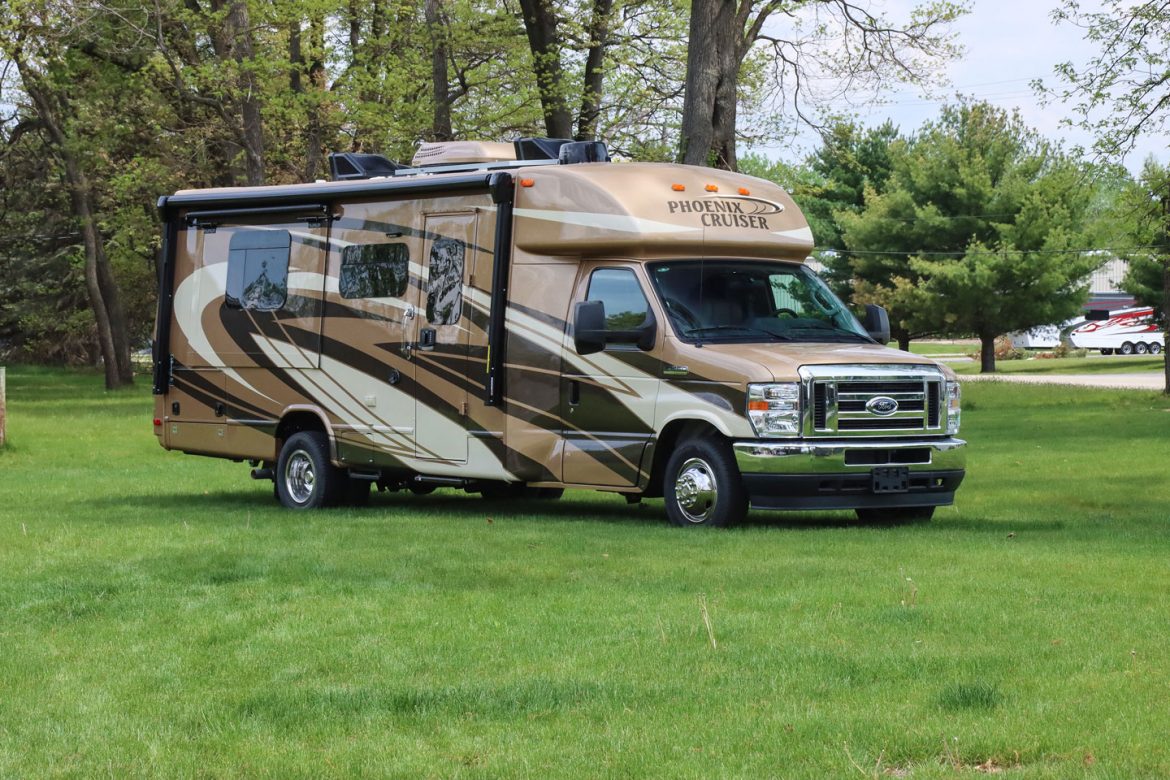This compact motorhome comes packed with features one might expect in a larger RV, plus a list of options that allows owners to personalize a vehicle for their travel style and needs.
By Mark Quasius, F333630
October 2021
Phoenix USA RV touts its line of motorhomes as a great choice for owners who wish to downsize from a larger RV. The company produces a small coach — a Type B+ — with a big focus on quality, which has resulted in high customer satisfaction ratings. A long list of available options allows each customer to create an RV tailored to their wants and needs. Most Phoenix Cruiser floor plans are built on a Ford E-series gasoline-powered chassis, but a four-wheel-drive Ford chassis is offered as well.
I tested a Phoenix Cruiser with the 2351D slideout queen bed floor plan. It was built on a Ford E-450 chassis and powered by a 7.3-liter V-8 engine that delivers 350 horsepower through a six-speed automatic transmission with tow-haul mode. A 4.56-to-1 rear axle ratio provides plenty of towing power via a 5,000-pound-rated Class III hitch.
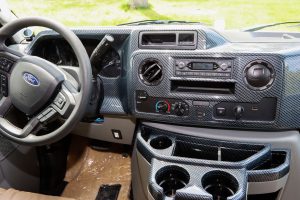
The cockpit.
The gross vehicle weight rating (GVWR) of the Phoenix Cruiser is 14,500 pounds, while the gross combination weight rating (GCWR) is 22,000 pounds. The unloaded weight of the test coach was 11,880 pounds, yielding an occupant and cargo carrying capacity (OCCC) of 2,620 pounds. The motorhome is built on a 182-inch wheelbase, utilizes LT225/75R16 tires, and has a 55-gallon fuel tank. Heated remote-control mirrors come standard, and HWH hydraulic leveling jacks can be added.
Construction
The Phoenix Cruiser begins with a steel subframe assembly that mounts to the chassis frame rails via rubber-puck dampeners to isolate vibrations and minimize noise inside the motorhome during travel. The floor assembly starts with a 11/2-inch steel tube framework that is topped with 1/2-inch exterior-grade plywood. A 1/4-inch-thick corrugated, laminated plastic sheet is applied to the bottom to further dampen vibrations and serve as a nearly indestructible vapor barrier. This sandwich is filled with block-foam insulation just prior to being capped off, providing a quiet and comfortable coach interior.
The vacubond-laminated sidewalls are framed with structural aluminum tubing. The seamless one-piece fiberglass roof blends with the curved sidewalls for a streamlined appearance. The transition between cab and coach is achieved via fiberglass panels that contribute to the overall aerodynamic styling of the Phoenix Cruiser. All the wiring is done by hand and is continuous in length to eliminate any wiring harness connectors that could potentially fail later as the coach ages. All plumbing is run above the floor line to eliminate potential freeze-ups during cold weather.
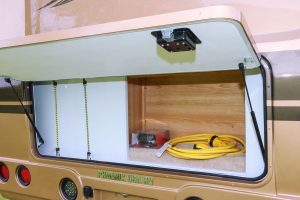
A rear trunk is easily accessible and provides an additional location to stow gear.
Exterior
Our test coach was finished in the optional Desert Sand full-body paint scheme, which includes two applications of clear coat.
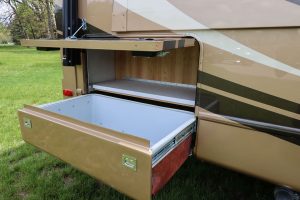
An exterior bay comes with a pull-out drawer and a removable shelf.
Frameless deep-tinted windows are used throughout the motorhome. The large power patio awning is equipped with LED lighting. A handy trunk capable of storing patio gear or towing accessories is located at the rear of the coach.
One nice touch was the screen door. Instead of a hinged screen door that attaches to the entry door, Phoenix Cruiser uses a retractable version. It consists of a bordered fabric screen that retracts into a roller housing on one side of the entry-door frame. To deploy the screen, simply pull it out by its handle and clip it onto the opposite side of the door frame with a latch. When you no longer want the screen, you unclip it, and it self-retracts into the roller housing and is out of sight. Another nice feature is standard keyless entry.
This 25-foot-11-inch-long coach has a 7-foot-9-inch overall width and a 10-foot-3-inch overall height. It has a low enough profile to park in areas with heavier tree cover, yet its 6-foot-4-inch interior height doesn’t cramp tall occupants. The 2351D floor plan is equipped with dual slideouts, which results in a roomy interior. Even with the slides retracted during travel, though, the wide aisle makes it easy to navigate inside.
Diamond Shield protects painted surfaces at the front of the RV against damage from stones and chips. Weather-shielded fiberglass running boards are molded to the coach to provide additional protection, and rear skid rollers prevent damage caused by bottoming out on steep approach angles.
Interior
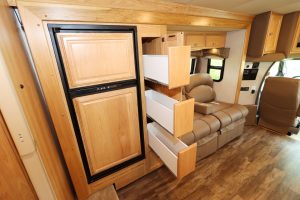
The main slideout holds the refrigerator, pantry, and theater seating.
The test coach was finished with the Desert Sand interior décor, a nice, bright, and cheery look that complemented the exterior paint scheme of the same name. It was finished with the standard Hickory hardwood cabinetry with raised-panel hardwood doors and drawers; other options are Cherry and Silver Mist wood tones and Shaker-style doors. Hickory, a popular choice among owners, is a durable hardwood that adds a classy appearance and, given its light color, also helps brighten up the interior. Vinyl flooring with a wood plank look complements the Hickory cabinetry and woodwork. Slow-rise day-night roller shades come standard. LED lighting is used throughout the coach to conserve power and minimize heat.
The main living area has one large slideout that holds a 54-inch-by-74-inch power sofa bed; a large pantry; and the refrigerator, which is covered with matching Hickory wood panels. Directly opposite the sofa and flanking the entry door are a recliner and the galley. The galley features a solid-surface countertop with a flip-up extension and is equipped with a flush-mounted, stainless-steel sink and a recessed two-burner propane range. A large convection-microwave oven resides in the overhead cabinetry.
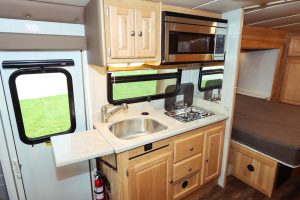
Galley conveniences include a counter extension and a cooktop cover.
The seamless, molded front fiberglass cap holds an optional 32-inch LED TV, the entertainment center components, and the surround-sound system. A 19-inch LCD TV can be added to the bedroom area.
The 2351D floor plan comes standard with a 60-inch-by-74-inch queen bed in a slideout. Opposite the slideout is the bath area, which is equipped with a large fiberglass shower that has a glass surround. The vanity holds a solid-surface sink and countertop. A porcelain toilet and mirrored wardrobe complete the bath area.
The cockpit is trimmed with a gold carbon-fiber dash panel and drink tray that give it an upscale look. Heated remote-control power mirrors and power door locks are part of the Premium Convenience Package, which contains numerous must-have features and is included on every coach. Both the pilot and copilot chairs swivel to face the rear of the coach for seating when in camp. The driver has a six-way power adjustable seat. A power copilot seat is available as an option. The test motorhome had an in-dash entertainment center equipped with a radio/DVD player/SiriusXM/media player, and Bluetooth capability for smartphones. An upgraded touch-screen model with Garmin in-dash navigation also is available.
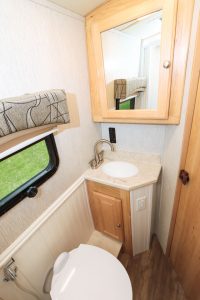
The bath area.
Utilities
A 30,000-Btu Truma Combi water heater and furnace is powered by propane to provide interior heat as well as continuous domestic hot water. This compact unit saves valuable storage space. A 15,000-Btu air conditioner with heat pump provides cooling.
An outside shower is housed in a dedicated compartment, close to the wet bay. The latter contains the various plumbing controls and the Sani-Con Turbo macerator pump. A 3-inch gravity dump is provided as a backup. A 26.5-gallon fresh-water tank is included, along with a 25.5-gallon black-water tank and a 23-gallon gray-water tank. Electric dump valves provide easy access for servicing these tanks.
The 120-volt electrical power is supplied by a 30-amp shore power cord or the optional Onan 4,000-watt generator. In addition, a 2,000-watt inverter can supply power for the entertainment center and some receptacles via the two 6-volt deep-cycle house batteries, which are mounted on a slide tray for easy service access.
Final Impressions
Phoenix Cruiser achieves its goal of offering a compact luxury motorhome with features expected in larger coaches. The construction quality and attention to detail were among the best I’ve seen. Phoenix Cruiser can handle many options and customer requests for personalizing a motorhome. With a wide choice of available floor plans, there is bound to be one that appeals to nearly every buyer looking for a smaller motorhome.
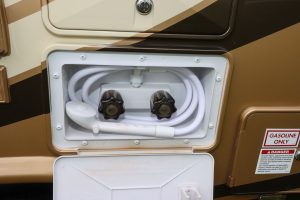
An outside shower has its own compartment.
With its 182-inch wheelbase and 25-foot-11-inch overall length, the coach was quite maneuverable. Those who want a four-wheel-drive machine to provide extra traction and safety can opt for a Ford 4×4 chassis. The LiquidSpring system is available as an option on the Phoenix Cruiser but was not included on the test coach. Having driven motorhomes with LiquidSpring suspension before, I imagine this option would make the Phoenix Cruiser ride and handle like an air-ride coach.
Phoenix Cruiser has a long list of satisfied owners. And for RVers looking to downsize but not give up features common to larger coaches, the company’s Type B+ may be the right choice.
SPECIFICATIONS | PHOENIX CRUISER 2351D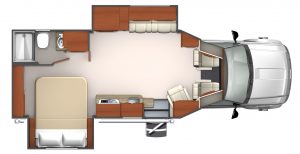
MANUFACTURER
Phoenix USA RV, 3504 Cooper Drive, Elkhart, IN 46514; (877) 754-8535, (574) 266-2020; www.phoenixusarv.com
MODEL
Phoenix Cruiser
FLOOR PLAN
2351D
CHASSIS
Ford E-450
ENGINE
Ford 7.3-liter V-8; 350 horsepower
TRANSMISSION
six-speed automatic
AXLE RATIO
4.56 to 1
TIRES
LT225/75R16
WHEELBASE
182 inches
BRAKES
disc, four-wheel ABS
ALTERNATOR
240/157 amps
BATTERIES
house — (2) 6-volt deep-cycle
ELECTRICAL SERVICE
30 amps
AUXILIARY GENERATOR
Onan 4,000-watt, optional
EXTERIOR LENGTH
25 feet 11 inches
EXTERIOR WIDTH
93 inches
EXTERIOR HEIGHT
10 feet 3 inches (with A/C)
INTERIOR HEIGHT
6 feet 4 inches
GROSS VEHICLE WEIGHT RATING (GVWR)
14,500 pounds
GROSS AXLE WEIGHT RATING (GAWR)
front — 5,000 pounds;
rear — 9,600 pounds
GROSS COMBINATION WEIGHT RATING (GCWR)
22,000 pounds
OCCUPANT AND CARGO CARRYING CAPACITY (OCCC)
2,620 pounds
FRESH WATER CAPACITY
26.5 gallons
HOLDING TANK CAPACITIES
gray water — 23 gallons;
black water — 25.5 gallons
FUEL CAPACITY
55 gallons
FUEL REQUIREMENTS
gasoline
PROPANE CAPACITY
42 pounds
WATER HEATER
Truma Combi, continuous flow
HEATING SYSTEM
30,000-Btu Truma Combi
AIR CONDITIONING
15,000-Btu, with heat pump
REFRIGERATOR
6-cubic-foot, propane and electric, standard; three-way (12-volt, 120-volt, propane), optional
TOILET
porcelain
WARRANTY
coach — 1 year/12,000 miles;
chassis — 3 years/36,000 miles;
powertrain — 5 years/60,000 miles
MANUFACTURER’S SUGGESTED RETAIL PRICE AS TESTED
$201,391

